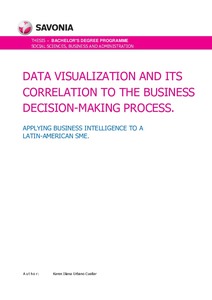Data Visualization and Its Correlation to the Business Decision-Making Process: Applying Business Intelligence to a Latin-American SME.
Cuellar, Karen (2020)
Cuellar, Karen
2020
Julkaisun pysyvä osoite on
https://urn.fi/URN:NBN:fi:amk-2020121628584
https://urn.fi/URN:NBN:fi:amk-2020121628584
Tiivistelmä
In 2020, Information Systems are revolutionizing business operations and within that context, the way businesses make their decisions based on their performance analysis. Determining if SMEs are undertaking non-grounded decisions is crucial to understand how business decisions are made and moreover if Information Systems are capable of improving the decision-making process within small and medium-sized companies.
Managers of SMEs, who are not aware of the importance of their business information and how it can affect their decision-making process, are more likely to experience poor managerial performance. This limits the level and quality of insights that these companies get from their overall performance. As a consequence, the process of Business Intelligence has been developed for the past few years and it has been widely adopted and incorporated as an analytical process in every large enterprise to support the decision-making process, yet not integrated into all the small and medium-sized enterprises.
The main purpose of this thesis was to analyze the impact of the Business Intelligence process (and data visualization as one of the main BI stages) as a completely new analytical tool introduced to a Peruvian SME that operates within the food industry and experiences several limitations such as their enterprise size, budget, and technological know-how.
The following academic research was carefully developed for four months and Business Intelligence instruments were developed to improve the company’s decision-making process. Those BI instruments were the result of self-development work and contained different BI tools such as interactive dashboards, databases, and data management processes. Data and observations were collected from top managers during every stage of this study. The company’s unique performance, levels of satisfaction, and system needs were assessed on periodical one-to-one online interviews. Moreover, the last assessment evaluated the impact of the BI methodology in the company’s operations and was measured through questionnaires. These assessed the usefulness and frequency of use of the BI instruments provided, as well as the end-user experience, and the impact of data visualization within the company.
The results obtained have demonstrated usage of only 58% for the BI instruments. However, the BI process brought up new information to 100% of the survey respondents, demonstrating the positive correlation between Business Intelligence and its contribution to the managerial decision-making process. Furthermore, the research has supported the hypothesis that companies that fulfill the aforementioned business-constraints criteria are more likely to experience limited performance insights that may happen unnoticed for top decision-makers. However, maybe the most important result this research pin-pointed was the opposition to transitioning from more traditional management methodologies to technologically advanced based solutions due, once more, to the three main business limitations aforementioned.
In conclusion, this thesis project has been successful in demonstrating a positive correlation between data visualization and its contribution to the decision-making process within an SME, but it has also brought up the incognita if SMEs are prepared to upgrade their traditional managerial working and analytical methodology to the benefits provided by Business Intelligence.
Managers of SMEs, who are not aware of the importance of their business information and how it can affect their decision-making process, are more likely to experience poor managerial performance. This limits the level and quality of insights that these companies get from their overall performance. As a consequence, the process of Business Intelligence has been developed for the past few years and it has been widely adopted and incorporated as an analytical process in every large enterprise to support the decision-making process, yet not integrated into all the small and medium-sized enterprises.
The main purpose of this thesis was to analyze the impact of the Business Intelligence process (and data visualization as one of the main BI stages) as a completely new analytical tool introduced to a Peruvian SME that operates within the food industry and experiences several limitations such as their enterprise size, budget, and technological know-how.
The following academic research was carefully developed for four months and Business Intelligence instruments were developed to improve the company’s decision-making process. Those BI instruments were the result of self-development work and contained different BI tools such as interactive dashboards, databases, and data management processes. Data and observations were collected from top managers during every stage of this study. The company’s unique performance, levels of satisfaction, and system needs were assessed on periodical one-to-one online interviews. Moreover, the last assessment evaluated the impact of the BI methodology in the company’s operations and was measured through questionnaires. These assessed the usefulness and frequency of use of the BI instruments provided, as well as the end-user experience, and the impact of data visualization within the company.
The results obtained have demonstrated usage of only 58% for the BI instruments. However, the BI process brought up new information to 100% of the survey respondents, demonstrating the positive correlation between Business Intelligence and its contribution to the managerial decision-making process. Furthermore, the research has supported the hypothesis that companies that fulfill the aforementioned business-constraints criteria are more likely to experience limited performance insights that may happen unnoticed for top decision-makers. However, maybe the most important result this research pin-pointed was the opposition to transitioning from more traditional management methodologies to technologically advanced based solutions due, once more, to the three main business limitations aforementioned.
In conclusion, this thesis project has been successful in demonstrating a positive correlation between data visualization and its contribution to the decision-making process within an SME, but it has also brought up the incognita if SMEs are prepared to upgrade their traditional managerial working and analytical methodology to the benefits provided by Business Intelligence.
